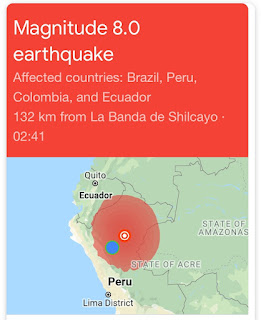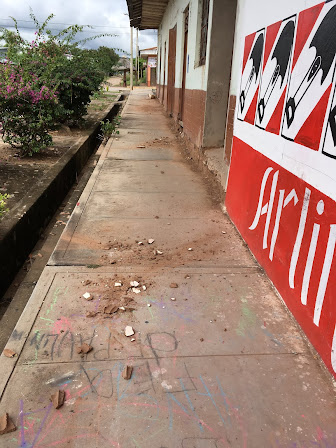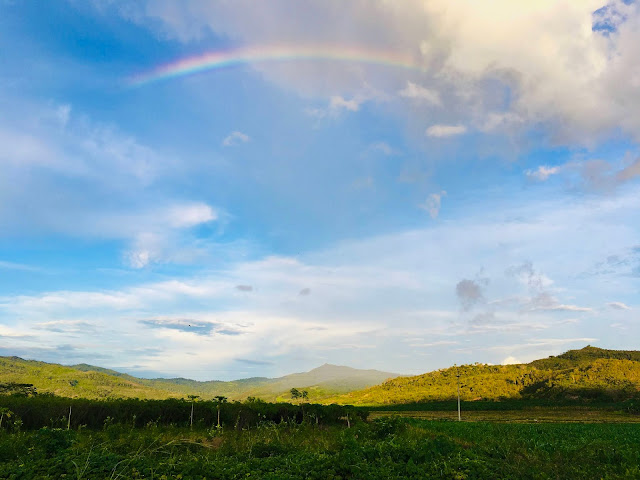In the (Epi)Center of God's Will
On May 26 at 2:40 in the morning, I was awoken out of a deep sleep by the shaking of my bed. Though I was groggy and disoriented, I knew exactly what had startled me and that the proper response to an earthquake was to get outside. My teammates and I made our way into our courtyard and stood there praying for what seemed like a very long 90 seconds.
When the earth moves below you, you realize how completely out of control you are over the situation. As we stood there listening to the water in the concrete cistern wildly splash back and forth due to the movement of the ground, the desire to escape was on my mind. I want to get out of this country. I want to go home.
After the shaking had subsided, we went back to our beds but not necessarily back to sleep. The remainder of the night was restless, as I continued to imagine my bed shaking, though it was only the feeling of my heart beating.
After the sun had risen and the electricity came back on, we looked up online reports and discovered that the epicenter of the 8.0-magnitude earthquake was only 100 miles from us. Due to the depth of the quake, it was felt over a large portion of land, but was not as destructive as those which happen closer to the earth's surface.
 |
| In the morning we learned that we were only 100 miles from the earthquake's epicenter. |
With the dawning of the day, my desire to flee subsided. Even being so close to the epicenter of a major earthquake, don't I know where my true safety lies? Before I had stepped into foreign missions for the first time, I remember someone sharing with me words that I will never forget: The safest place in the world is right in the center of God's will for you.
It is here that I am with my people—the people I have been called to serve. I am here with Teresita, an older woman whose poor home suffered damage from the earthquake tremors and has to be rebuilt. Though I struggle to answer her questions of "why did God allow this to happen to me?," I can at least be there with her in her anxiety and sadness. And I can help her with the funds needed to rebuild, since she has almost nothing.
 |
| Earthquake damage inside Teresita's home |
I am here with the children to whom God has called me to teach music. There is eight-year-old Elena. Her family is extremely poor, but she is exceptionally bright. I didn't expect her to catch on to playing the recorder so quickly, but after only a couple of lessons, she told me about how it all made sense to her. She understood how the notes on the page corresponded to the fingering on the instrument. I can see it in my head, she told me with excitement.
 |
| Elena practicing recorder. I'm impressed with her natural talent and excitement for music. |
I am here with Erika, another student to whom learning doesn't come as easily. At eight years old she still doesn't read and most likely has dyslexia. We have heard heartbreaking stories of her difficult home life. Her attention span is short, even for her age. Though she struggles to understand the music on the page, she knows the names of the notes on the recorder and can learn melodies by watching and imitating me. We share the excitement and exchange high fives when she plays an entire two-line song almost perfectly.
 |
| Cousins Erika and Elena. When they're not playing music at our house, they're asking for paper and pencils to draw pictures. |
I am here with Rosario, a thirty-nine-year-old mother of three whom I met at a retreat we held in another town. There was an immediate connection between us, and we chatted at length. She needed to pour out her heart to someone who would listen. She shared with me her struggles of never being able to save enough money to get ahead, still renting a home after many years instead of being able to purchase property. Her two teenagers have great career ambitions, yet she has no idea how they will have enough funds to help them study after high school.
In the course of the conversation I learned that none of her children have been baptized, nor have she and her husband been married in the Church. As she shared her preoccupations, I encouraged her to meditate on the Word of God and journal as a way to seek the Lord's help and guidance in her life. I also mentioned that she might talk to Inge, one of the missionaries in her town about receiving the sacraments. I told her I would get a Bible to her (and was able to send it through Inge the next day). The next time I saw Inge, she told me that Rosario approached her about having the kids baptized! And she asked if I would be the Godmother.
I am here with people who, unknowingly, encourage me to continue on, even when mission life is challenging, overwhelming, and even frightening. There are still days when I wonder if I can persevere another month, another six months, another two years. But I don't have to persevere any length of time—at least not today. I only need to live and serve today. And tomorrow I'll do it again. Day-to-day living, just like the poor.
The poor are no longer some far-off population in my mind that I was once discerning whether or not I should leave everything to serve. They have faces. They have bodies and souls, hopes and desires. And they have become my friends. These real people—Teresita, Elena, Erika, Rosario, and the other young, poor, sick and marginalized of our pueblos—are my people. I am here with them and for them. It is here with these people that I seek to love and serve, knowing that I'm safe in the center of His will.
 |
| Our dear friend Teresita is pictured second from the left, wearing red. |
 |
| Overlooking Leoncio Prado, a small farming town where we held a healing retreat and where I met Rosario |




Comments
Post a Comment